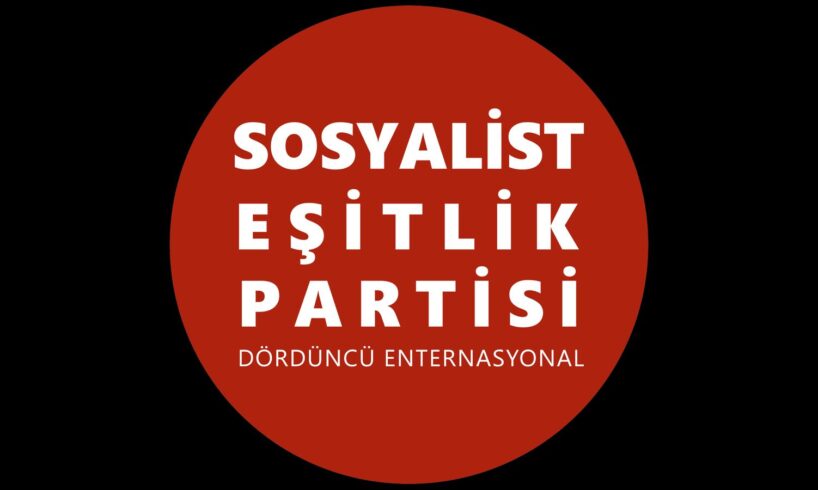
The Sosyalist Eşitlik Partisi – Dördüncü Enternasyonal (Socialist Equality Party – Fourth International) was officially established on August 1, 2025, as the Turkish section of the International Committee of the Fourth International. The party received a letter dated September 15, 2025, signed by Muhsin Şentürk, Chief Prosecutor of the Supreme Court of Appeals, and titled “Review of the Sosyalist Eşitlik Partisi – Dördüncü Enternasyonal’s Constitution and Program.” It requested changes to our constitution and program, which were unanimously adopted its at its founding congress on June 13–15, 2025. As a major figure in the Turkish state, the Chief Prosecutor of the Supreme Court of Appeals is appointed by the president.
The issues concerning the constitution are technical in nature. However, we categorically reject the demands expressed regarding our program (“Statement of Principles”) which asked to change or remove demands such as “education in one’s mother tongue” and “Kurdish becoming an official language with constitutional guarantees,” as they constitute political interference. Below we are publishing the Sosyalist Eşitlik Partisi’s official response to Supreme Court of Appeals Prosecutor’s Office. We call on readers of the World Socialist Web Site and all defenders of democratic rights to oppose this unacceptable intervention and to share our statement as widely as possible.
***
November 3, 2025
To the Supreme Court of Appeals Prosecutor’s Office of Turkey
We hereby inform you that our party, the Sosyalist Eşitlik Partisi – Dördüncü Enternasyonal (hereinafter referred to as the “Sosyalist Eşitlik Partisi”), which was officially established on August 1, 2025, has received your letter dated September 15, 2025, numbered 51047475/ 2025-1372, with the subject “Review of the Sosyalist Eşitlik Partisi – Dördüncü Enternasyonal’s Constitution & Program,” signed by Chief Prosecutor of the Supreme Court of Appeals, Muhsin ŞENTÜRK, has been reviewed by our party’s leadership.
Accordingly;
Regarding our Constitution, you have noted that “Although Article 1 of the Party Constitution specifies that the Party’s name is ‘Sosyalist Eşitlik Partisi – Dördüncü Enternasyonal,’ the use of the term ‘Sosyalist Eşitlik Partisi’ as the Party name in many places throughout the Party Constitution has created confusion.”
Therefore, changes to the Constitution and Program have been requested. But these assessments are incorrect. Because Article 1 of our Party Constitution also states that the abbreviated form of the Party name is “Socialist Equality Party.” This indicates that “Socialist Equality Party” can be used as the abbreviated form of the party name in the Constitution, the Program, and other texts.
Considering the technical nature of certain other matters specified in our Constitution, a resolution has been taken to convene an Extraordinary Constitution Congress.
However, the party leadership has concluded that the points raised regarding our Program constitute an interference with our party’s freedom of expression and independence, and that the demands for changes to the Program constitute a violation of rights. Therefore, it has been decided that no changes will be made to the Program.
The Supreme Court of Appeals Prosecutor’s Office states the following regarding our Program in its relevant letter:
In the Party Program:
Under the heading “Proletarian internationalism against nationalism”;
Section 52; [It reads:]
“Fighting for education in the mother tongue, for the constitutional guarantee of the Kurdish language and for the recognition of all other democratic and cultural rights as well as freedom for political prisoners, the Sosyalist Eşitlik Partisi insists that the only way to the lasting peace and democratic rights that the working people long for is the unification of workers of all nationalities in the Middle East and in the imperialist countries in the fight for global socialism and against war and neo-colonial oppression. It means fighting for the Socialist Federation of the Middle East, which will be part of a world socialist federation.” [Emphasis in Prosecutor’s Office’s letter]
Section 53;
“The Sosyalist Eşitlik Partisi also resolutely fights against chauvinist attacks and historical falsification against minorities who were a major part of Turkey’s population and culture in the past and whose proportion in the population has been gradually reduced by systematic state policies. It seeks to unite these communities under the revolutionary leadership of the working class.” [Emphasis in Prosecutor’s Office’s letter]
The following statements in the Party Program’s aforementioned sections are contrary to the following constitutional and legal provisions: “Fighting for education in the mother tongue, for the constitutional guarantee of the Kurdish language … the Sosyalist Eşitlik Partisi” and “The Sosyalist Eşitlik Partisi also resolutely fights against chauvinist attacks and historical falsification against minorities who were a major part of Turkey’s population and culture in the past and whose proportion in the population has been gradually reduced by systematic state policies.”
The Constitution and Law No. 2820 on Political Parties [states];
“-The Turkish State is an indivisible whole with its country and nation. Its language is Turkish. No language other than Turkish may be taught or instructed as a mother tongue to Turkish citizens in educational and teaching institutions;” [Article 3 of the Constitution]
-”Political parties
“cannot change the provisions regarding the language of the Turkish State as explained in Article 3 of the Constitution;
“They cannot create distinctions based on language or race;
“They cannot pursue this goal or engage in activities aimed at this goal, nor can they incite or encourage others to do so.
“They cannot claim that there are minorities within the territory of the Republic of Turkey.”
Accordingly, the statements in the Program that are contrary to the Constitution of the Republic of Turkey and Law No. 2820 on Political Parties must be amended.
In light of the above explanations;
1- Your Party Constitution and Program shall be revised in accordance with the Turkish Constitution and Law No. 2820 on Political Parties, eliminating any inconsistencies/contradictions,
2- The outcome shall be reported to our Office of the Chief Prosecutor within 60 days of the notification of this letter,
3- No contrary actions shall be taken until the Party Constitution and Program are amended,
4- Otherwise, in accordance with Article 104/1 of the Political Parties Law No. 2820, our Chief Prosecutor’s Office will file a warning lawsuit with the Constitutional Court.
We request your attention and action regarding these matters.
The response of the Sosyalist Eşitlik Partisi – Dördüncü Enternasyonal to the demands for program changes cited above from the Supreme Court of Appeals Prosecutor’s Office’s letter titled, “Review of the Sosyalist Eşitlik Partisi – Dördüncü Enternasyonal’s Constitution and Program” is as follows:
The Sosyalist Eşitlik Partisi – Dördüncü Enternasyonal rejects the demands to change or remove the demands in our Program, such as “education in one’s mother tongue, and to make Kurdish an official language with constitutional guarantees,” which are legitimate democratic demands supported by broad masses in Turkey and expressed in various forms in the programs of many other official political parties, as an unacceptable intervention not only against our party but also against the fundamental democratic rights of other political parties and citizens who defend these demands.
These rights are protected in the Constitution of the Republic of Turkey, albeit with significant limitations, as follows:
VII. Freedom of thought and opinion
ARTICLE 25 – Everyone has the freedom of thought and opinion.
No one shall be compelled to reveal his/her thoughts and opinions for any reason or purpose; nor shall anyone be blamed or accused because of his/her thoughts and opinions.
VIII. Freedom of expression and dissemination of thought
ARTICLE 26– Everyone has the right to express and disseminate his/her thoughts and opinions by speech, in writing or in pictures or through other media, individually or collectively. This freedom includes the liberty of receiving or imparting information or ideas without interference by official authorities.
The international socialist movement, which our party defends as its legacy, has historically been the most consistent defender of fundamental democratic rights in order to secure the international unity of workers in the struggle to establish socialism worldwide. This requires opposing any official or unofficial oppression or discrimination against any community, or any form of privilege, and defending political equality for all individuals and peoples. On this matter, with all its limitations, the current Turkish Constitution states the following:
X. Equality before the law
ARTICLE 10– Everyone is equal before the law without distinction as to language, race, colour, sex, political opinion, philosophical belief, religion and sect, or any such grounds.
The Sosyalist Eşitlik Partisi, as stated in its Program, “demands full equality for all people and defends unequivocally their democratic rights.” Our party explains that the concepts of equality and democracy cannot be considered independently of social classes, economic and political conditions. Therefore, our program states: “The defense of democratic rights is inseparably bound up with the struggle for socialism. As there can be no socialism without democracy, there will be no democracy without socialism. Political equality is impossible without economic equality.” It is essential that the working class consistently defend democratic rights and political equality in the struggle to build a socialist society that will ensure true equality for all people worldwide.
The denial and disregard of the fundamental democratic rights of the Kurdish people, including their language, violates the provision highlighted by the Supreme Court of Appeals Prosecutor’s Office that “the Turkish State is an indivisible whole with its country and nation” and results in “creating distinctions based on language or race.” Although the exact number is unknown because it has not been officially counted in Turkey, it is widely known that the Kurdish people consist of millions of individuals. The existence of multiple official languages that cater to different language communities living in a country is not “divisive” but “unifying.” Switzerland, where German, French, Italian, and Romansh are official languages, is a well-known historical example in this regard.
The Soviet Union, which did not have a single official language, paid great attention to the democratic rights of all peoples and to the language issue, particularly in its early years, with the aim of uniting workers and peasants of countless nationalities on the basis of fraternal equality. The decree signed by Vladimir Lenin on December 26, 1919, entitled “On the eradication of illiteracy of population in the RSFSR,” [1] made it compulsory for everyone between the ages of 8 and 50 who could not read or write to learn to read and write in their native language or, if they wished, in Russian. The principled stance of the Soviet government on nationalities, which aimed to establish a socialist world society that would eliminate all sources of oppression, was not limited to its own citizens. During the same period, it was the Soviet government, led by Vladimir Lenin and Leon Trotsky, that rushed to the aid of the national liberation movement against imperialist colonial occupation in Turkey, providing both political and military support.
Lenin, left, and Trotsky
The Sosyalist Eşitlik Partisi advocates a peaceful resolution to the Kurdish question, a fundamental political issue that has persisted since the founding of the Republic of Turkey [in 1923], through the recognition of basic democratic rights; it calls on the working class and other sections of the people to fight in a mass movement for the achievement and securing of these fundamental rights. We explain that this means fighting for global socialism against the socio-economic conditions that give rise to national oppression and inequality. Only in this way can a sense of brotherhood and trust be developed among workers and peoples, and only in this way can a lasting solution be achieved to this question, which has led to paying great prices for decades.
Our party argues that such a solution is only possible with a socialist constitution, but at the same time it is fighting for the immediate achievement and implementation of fundamental democratic rights. Moreover, the Sosyalist Eşitlik Partisi is not the only party advocating for the replacement of the 1982 Constitution, imposed by the military junta [that came to power with the 1980 coup], with a new constitution. The Justice and Development Party (AKP) is perhaps the best-known party for its demand and call for a “new constitution” since it has been in power since 2002.
AKP Chairman and President Recep Tayyip Erdoğan said the following on this subject in a speech on October 8, 2025:
Both the 1961 Constitution and the 1982 Constitution are riddled with traces of distrust toward democratic processes, political parties—an integral part of these processes—and, in particular, the national will. This spirit of tutelage, which permeates the essence and wording of the constitutional texts, has built bastions, castles, and towers in many places to perpetuate its existence. Despite recent comprehensive revisions, the need for a new and civilian constitution has not been fully met. A civilian constitution that draws on the wisdom of the nation rather than coups, rejecting the negative legacy of military interventions that have fragmented our democratic experience, remains the greatest aspiration of our citizens. [2]
The fact that there is widespread support for education in one’s mother tongue in Turkey is clearly evident in the data presented by Nejla Demir, Member of Parliament for Ağrı from the Peoples’ Equality and Democracy Party (DEM Party), in her speech at the Turkish Grand National Assembly session on February 20, 2025. [3] Expressing democratic demands such as, “For lasting peace and a dignified life, restrictions on the Kurdish language must be lifted immediately, the right to education in one’s mother tongue must be recognized at all levels of education, and Kurdish (Kurmancî and Kirmanckî) must be recognized as an official language,” Demir also pointed out that “in the current education system in Turkey, children whose mother tongue is not Turkish start the education process at a disadvantage, and this situation leads to pedagogical, psychological, and sociocultural problems.”
The survey titled “Research Report on the Level of Use of Native Languages Other Than Turkish in Turkey and Related Demands and Trends,” conducted by the Sosyo Politik Saha Araştırmaları Merkezi (Center for Socio-Political Field Research) in 22 cities between January 28 and February 11, 2025, which was referenced in the same speech, is highly informative. [4] Focusing on Kurdish citizens, 97.5% of the 1,285 participants in the study stated that their ethnic origin was Kurdish. 97.8% of respondents answered “Yes” to the question, “Would you like your child to be educated in their mother tongue?” The percentage of those who answered “Yes” to the question “Do you think your mother tongue should be protected and developed?” was 97.7%. More than 80% of the answers to the question “What do you think is the greatest threat to the survival of your mother tongue?” consisted of the following three answers: “Lack of education in the mother tongue” (46.5%), “Oppression and assimilation policies” (19.6%), “Lack of legal status” (15.1%). The survey also indicates that native language use decreases as the age of household members decreases and points to the process of extinction of languages other than Turkish spoken by citizens of the Republic of Turkey.
The importance and necessity of education in one’s mother tongue has been the subject of numerous studies and international agreements. As stated by the United Nations Educational, Scientific and Cultural Organization (UNESCO), of which Turkey is a founding member, on International Mother Language Day 2023, “While mother-tongue-based education is essential to the full development of individuals and to the transmission of linguistic heritage, 40% of the world’s students do not have access to education in the language they speak or understand best. Such a situation severely undermines learning, cultural expression and the building of social relations, and significantly weakens the linguistic heritage of humanity.” [5] UNESCO’s International Mother Language Day 2024 message also emphasized the importance of mother tongue education, stating, “The scientific studies are clear: learning in one’s mother tongue is essential to success at school. This boosts self-esteem, awakens curiosity from an early age, and facilitates cognitive development.” [6]
In 2012, Law No. 6287 issued by the AKP government and Circular No. 2012/37 on Optional Courses published by the Turkish Ministry of National Education introduced Kurdish and other languages spoken in Turkey as optional courses under the name “Living Languages and Dialects.” It should be emphasized that this is not education in the mother tongue, but rather an extremely limited and inadequate application.
Another example of constitutional and legal inadequacies and contradictions regarding education in one’s native language can be seen in the following statement made by Mehmet Uçum, chief advisor of president, in December 2024:
Kurdish language courses are available as electives in public schools. Kurdish language courses are available as electives in private schools. Universities offer undergraduate programs in Kurdish language and literature/culture, as well as graduate programs. It is possible to open Kurdish language courses. It is permissible to open private schools where Kurdish is the language of instruction.” [7] [Emphasis added]
The last sentence by Uçum refers to the following amendment made to the relevant law on March 2, 2014:
(Additional clauses: 2/3/2014-6529/11) Furthermore, private schools may be established for the purpose of providing education and instruction in different languages and dialects traditionally used by Turkish citizens in their daily lives, subject to the provisions of the Private Education Institutions Law. The languages and dialects to be used for education and instruction in these institutions shall be determined by a decision of the President. The principles and procedures regarding the establishment and supervision of these institutions shall be regulated by a regulation to be issued by the Ministry of National Education. [8]
This amendment to the law, which could be interpreted as “unconstitutional” because it involves “education and instruction in different languages and dialects,” has not been implemented because the Ministry of National Education has not issued any regulations. Moreover, the Sosyalist Eşitlik Partisi opposes the establishment of separate private or public schools for children with different native languages, as this would serve to deepen artificial divisions and alienation between peoples, and advocates for all children to be provided with education in their native language in common public schools. The elimination of any privileges granted to a particular language or any discrimination imposed is of great importance in building people to form a brotherly unity based on respect for each other’s languages, cultures, and fundamental rights from childhood onwards.
As we have stated, the right to education in one’s mother tongue or an official language is freedom of expression that should be defended by both political parties and individuals through democratic means. At the 13th meeting of the “National Solidarity, Brotherhood, and Democracy Commission” established in the Turkish Grand National Assembly in the name of resolving the Kurdish issue, held on October 2, 2025, the lawyers who were heard emphasized the importance of education in the mother tongue.
For example, Serhat Çakmak from the Özgürlük için Hukukçular Derneği (Lawyers for Freedom Association) proposed amending Article 42 of the Constitution to read: “In addition to Turkish, education may be provided in native languages and dialects in educational institutions.” [9]
Prof. Dr. Fazıl Hüsnü Erdem, a constitutional law expert and an academic at Dicle University Faculty of Law, stated the following in the same commission meeting:
Without exaggeration, one could say that the mother tongue is at the heart of this issue… The best way to ensure the implementation of cultural identity rights, including those related to the mother tongue, is for Turkey to recognize these rights at the constitutional level… I also have a three-paragraph proposal regarding the article on linguistic rights. The first paragraph [of proposal] reads: “Everyone has the freedom to express and disseminate their thoughts and opinions in their mother tongue. Everyone has the right to establish, operate, and benefit from written, visual, and auditory communication in their mother tongue.” The second paragraph states: “Everyone has the right to receive an education in their mother tongue.” Third paragraph: “Everyone has the right to receive public services in their mother tongue and to use their mother tongue when interacting with public authorities.” [10]
In its document titled “Legal Requirements and Recommendations for Social Peace in the Context of the Kurdish Issue in Turkey,” published in October 2024, the Diyarbakır Bar Association states the following:
Using, learning, and developing one’s mother tongue in all areas of life, as well as receiving an education in one’s mother tongue, is a fundamental right.
Article 42 of the Constitution, which stipulates Turkish as the language of education, essentially prohibits the use of Kurdish in education and instruction by excluding schools that provide education and instruction in Western languages such as English, French, German, and Italian. This prohibition undoubtedly applies not only to Kurdish, but also to all other native languages, disregarding the cultural diversity of Turkish society. Article 42 also creates distinctions without legitimate legal justification between non-Muslim students whose native language is not Turkish; students receiving education and instruction in Western languages; and students belonging to ethnic groups, such as Kurds, Laz, Bosniaks, and Arabs, who are Muslim but whose native language is not Turkish. This demonstrates that the state discriminates among its citizens with regard to the fundamental human right to education. Furthermore, a significant proportion of Kurdish children living in the eastern and southeastern regions of the country do not learn Turkish by the time they reach school age. Thus, this constitutional obstacle to education in the Kurdish mother tongue also prevents equal educational opportunities.
To ensure equal educational opportunities for all students, regardless of their ethnic, cultural, or religious identity, the constitutional article regulating the right to education must not prohibit education in one’s mother tongue. The new regulation must constitutionally guarantee the right to education in one’s mother tongue. [11]
Numerous examples exist of administrative penalties imposed for requesting an education in one’s mother tongue being overturned by Turkish courts and condemned as “human rights violations” by the European Court of Human Rights (ECHR).
In the fall of 2001, students at Istanbul University submitted 500 petitions to the rector’s office, demanding “education in their mother tongue.” [12] According to another news report, 32 students who applied for elective Kurdish language courses were expelled by the Istanbul University Disciplinary Board in 2002. [13] 38 students were suspended for two semesters, and seven students were suspended for one semester. According to the same report, in December 2002, an Administrative Court ruled that the penalties imposed on the students were unlawful and overturned them. The court stated that the students’ petition or expression of their opinions could not be grounds for disciplinary action. On December 12, 2017, the ECHR, to which eight students applied;
2. Declares, by a majority, the complaints concerning alleged denial by the authorities of the applicants’ right to education on account of the disciplinary sanctions imposed on them admissible; …
4. Holds, by five votes to two, that there has been a violation of Article 2 of Protocol No. 1 to the Convention; [14]
The relevant article from the European Convention on Human Rights regarding the “Right to Education” is as follows:
No person shall be denied the right to education. In the exercise of any functions which it assumes in relation to education and to teaching, the State shall respect the right of parents to ensure such education and teaching in conformity with their own religious and philosophical convictions. [15]
The ECHR ruled in favor of 18 Afyon Kocatepe University students who were disciplined for making the same request on education in their mother tongue between December 2001 and January 2002. The court found that the “Right to Education” article had been violated. In December 2003, the Council of State in Turkey accepted the students’ appeal. In announcing its rule, the ECHR stated the following:
As regards the principle of proportionality, the Court observes that the applicants were subject to a disciplinary sanction for merely submitting petitions which conveyed their views on the need for and the necessity of Kurdish language education and requested that Kurdish language classes be introduced as an optional module, without committing any reprehensible act. In this connection, the Court finds that, in view of the information contained in the case file, the applicants did not resort to violence or breach or attempt to breach the peace or order in the university.
The Court finds therefore that the applicants were sanctioned because of the views expressed in their petitions… [16]
Lastly, two closure cases were filed against the Education and Science Workers’ Union (Eğitim-Sen) because its constitution advocated that everyone shall have a right to receive an education in their “mother tongue.” The union had 167,000 members at the time. On September 25, 2012, the Republic of Turkey was found guilty of violating Articles 10 and 11 of the European Convention on Human Rights (“Freedom of expression” and “Freedom of assembly and association” articles). Following the second closure case, Eğitim-Sen removed the phrase “education in the mother tongue” from its constitution but reinstated it at its 8th Ordinary General Assembly on May 15, 2011. [17]
The relevant ruling of the European Court of Human Rights states the following:
66. The Court reiterates that the fact that their activities form part of a collective exercise of freedom of expression in itself entitles political parties to seek the protection of Articles 10 and 11 of the Convention …
67. It further reiterates that freedom of expression constitutes one of the essential foundations of a democratic society. Subject to paragraph 2 of Article 10, freedom of expression is applicable not only to “information” or “ideas” that are favourably received or regarded as inoffensive or as a matter of indifference, but also to those that offend, shock or disturb the State or any sector of the population. Such are the demands of that pluralism, tolerance and broadmindedness without which there is no “democratic society.” …
Courtroom of the European Court of Human Rights in Strasbourg [Photo by Adrian Grycuk / CC BY-SA 3.0]
70. The Court lastly observes that, in a democratic society based on the rule of law, political ideas which challenge the existing order and whose realisation is advocated by peaceful means must be afforded a proper opportunity of expression through the exercise of the right to freedom of association. …
76. In conclusion, the Court finds that the proceedings initiated for the dissolution of the applicant union – forcing it to delete the impugned wording from its constitution – were disproportionate to the aims pursued and were not therefore “necessary in a democratic society”. [18]
Article 81 of Law No. 2820 on Political Parties, which is referenced in the letter from the Supreme Court of Appeals Prosecutor’s Office concerning our party’s Program under the heading “Prevention of the Creation of Minorities,” states:
Political parties:
a) shall not claim that there are minorities within the territory of the Republic of Turkey based on national or religious culture, sect, race, or language differences.
This article contradicts historical facts, academic studies, and political reality. The following is an example of the latter: On March 27, 2025, the Communications Directorate of the Presidency of the Republic of Turkey reported that AKP Chairman and President Erdoğan “met with representatives of religious minorities at an iftar dinner” and said he was “very pleased to share the iftar table with representatives of religious minority communities in Turkey.” [19]
In terms of historical facts and “official minorities,” the Lausanne Peace Treaty, signed on July 24, 1923, and considered a founding document of the Republic of Turkey, levelled all Muslim peoples under the “Turkish” identity through a political decision. Only non-Muslim religious minorities (Armenians, Greeks, and Jews) were recognized. These provisions are detailed in the section titled “Protection of Minorities” (Articles 37–45). [20]
Article 90 of the Turkish Constitution clarifies the inconsistency between the provisions of the Lausanne Treaty and Law No. 2820 on Political Parties, stating the following:
International agreements duly put into effect have the force of law. No appeal to the Constitutional Court shall be made with regard to these agreements, on the grounds that they are unconstitutional. (Sentence added on May 7, 2004; Act No. 5170) In the case of a conflict between international agreements, duly put into effect, concerning fundamental rights and freedoms and the laws due to differences in provisions on the same matter, the provisions of international agreements shall prevail.
The Sosyalist Eşitlik Partisi does not propose the artificial creation of “minorities” in its Program. Based on historical, social, and political facts, it “resolutely fights against chauvinist attacks and historical falsification against minorities who were a major part of Turkey’s population and culture in the past and whose proportion in the population has been gradually reduced by systematic state policies. It seeks to unite these communities under the revolutionary leadership of the working class.”
In conclusion, the above explanations clearly demonstrate why the changes demanded in our party’s program contradict freedom of expression and the right to engage in democratic politics. Without compromising its program or principles, the Sosyalist Eşitlik Partisi will continue to struggle for genuine democracy and socialism, which will only be achieved through the independent mass mobilization of the international working class against the capitalist system.
For your kind attention,
Ulaş Sevinç
Chairman of the Sosyalist Eşitlik Partisi – Dördüncü Enternasyonal
Footnotes
[1] See https://lenin.shm.ru/en/decree-on-eradication-of-illiteracy-among-the-population-of-the-rsfsr/
[2] See https://www.iletisim.gov.tr/turkce/haberler/detay/cumhurbaskani-erdogan-barisin-tum-yukunu-hamasa-ve-filistinlilere-yuklemek-ne-adildir-ne-dogrudur
[3] See https://www.evrensel.net/haber/543742/nejla-demirden-ana-dilinde-egitim-hakki-icin-meclis-arastirmasi-talebi
[4] See https://sahamerkezi.org/wp-content/uploads/2025/02/anadil_calismasi_basin_metni_ocak_2025-2.pdf
[5] See https://unesdoc.unesco.org/ark:/48223/pf0000384469_eng?posInSet=1&queryId=N-863087c6-61d0-466c-a0ed-ae8a477825fa
[6] See: https://unesdoc.unesco.org/ark:/48223/pf0000388791_eng?posInSet=1&queryId=N-a3bbfcc4-5585-4145-ba25-69f42848fbb4
[7] See https://serbestiyet.com/featured/mehmet-ucumdan-anadilde-egitim-aciklamasi-egitimde-zorunlu-tek-dil-turkcedir-191032/
[8] See https://www.mevzuat.gov.tr/MevzuatMetin/1.5.2923.pdf
[9] See https://www.tbmm.gov.tr/Tutanaklar/TutanakGoster/5252
[10] See https://www.tbmm.gov.tr/Tutanaklar/TutanakGoster/5252
[11] See https://www.diyarbakirbarosu.org.tr/public/uploads/files/T%C3%9CRK%C4%B0YE%E2%80%99DE%20K%C3%9CRT%20MESELES%C4%B0%20BA%C4%9ELAMINDA%2C%20TOPLUMSAL%20BARI%C5%9E%20%C4%B0%C3%87%C4%B0N%20HUKUK%C4%B0%20GEREKL%C4%B0L%C4%B0KLER%20VE%20%C3%96NER%C4%B0LER%20(1).pdf
[12] See https://bianet.org/yazi/16-yil-once-anadilinde-egitim-istiyoruz-talebiyle-bir-kampanya-baslatmistik-192429
[13] See https://bianet.org/haber/aihm-den-istanbul-universitesi-nde-kurtce-dersi-karari-192356
[14] See https://hudoc.echr.coe.int/fre#{%22itemid%22:[%22001-179408%22]}
[15] See https://www.echr.coe.int/documents/d/echr/convention_ENG
[16] See https://hudoc.echr.coe.int/eng#{%22itemid%22:[%22001-91532%22]}
[17] See https://bianet.org/haber/aihm-anadilde-egitim-hakki-talebi-ifade-ozgurlugudur-141077
[18] See https://hudoc.echr.coe.int/eng#{%22itemid%22:[%22001-113410%22]}
[19] See https://www.iletisim.gov.tr/turkce/haberler/detay/cumhurbaskani-erdogan-dini-azinlik-temsilcileri-ile-iftarda-bir-araya-geldi
[20] See https://www.mfa.gov.tr/lausanne-peace-treaty-part-i_-political-clauses.en.mfa
Sign up for the WSWS Educators Newsletter
Receive news and information on the fight against layoffs and budget cuts, and for the right to free, high-quality public education for all.





